Overview
The article provides key insights into obesity medication and its implications for women’s health, with a particular emphasis on the effectiveness of GLP-1 therapies. These medications are highlighted for their potential to facilitate significant weight loss and enhance overall well-being for women, especially during hormonal transitions. Research supports these claims, showcasing substantial results from clinical trials.
Furthermore, the article underscores the importance of personalized care and ongoing support in achieving sustainable weight management.
Introduction
The increasing prevalence of obesity among women, especially during critical life stages such as menopause, has sparked an essential discussion about effective treatment options. With the introduction of GLP-1 medications, a promising path emerges for addressing weight management while also improving overall health. This article explores seven key insights regarding obesity medication specifically designed for women, examining not only the benefits but also the challenges and considerations associated with these treatments. How can women navigate the complexities of obesity medication to achieve sustainable health improvements?
Tyde Wellness: Personalized GLP-1 Therapy for Effective Weight Loss
Tyde Wellness offers designed specifically for women experiencing menopause and perimenopause, focusing on body mass reduction through targeted therapies and hormone equilibrium solutions. These programs combine medical expertise with smart nutrition, custom fitness plans, and obesity medication, ensuring that each participant receives a program aligned with their unique lifestyle and health needs.
The advantages of this approach include ongoing support and a focus on sustainable weight loss solutions. By empowering women to reclaim their health effectively and safely, Tyde Wellness fosters a positive environment for personal growth. Many participants experience significant results, achieving a total weight loss of 20-25% over the course of a year, alongside improvements in energy, mood, and overall quality of life.
In summary, Tyde Wellness’s comprehensive approach not only addresses weight loss with obesity medication but also enhances overall well-being, making it a valuable option for women navigating these life transitions.
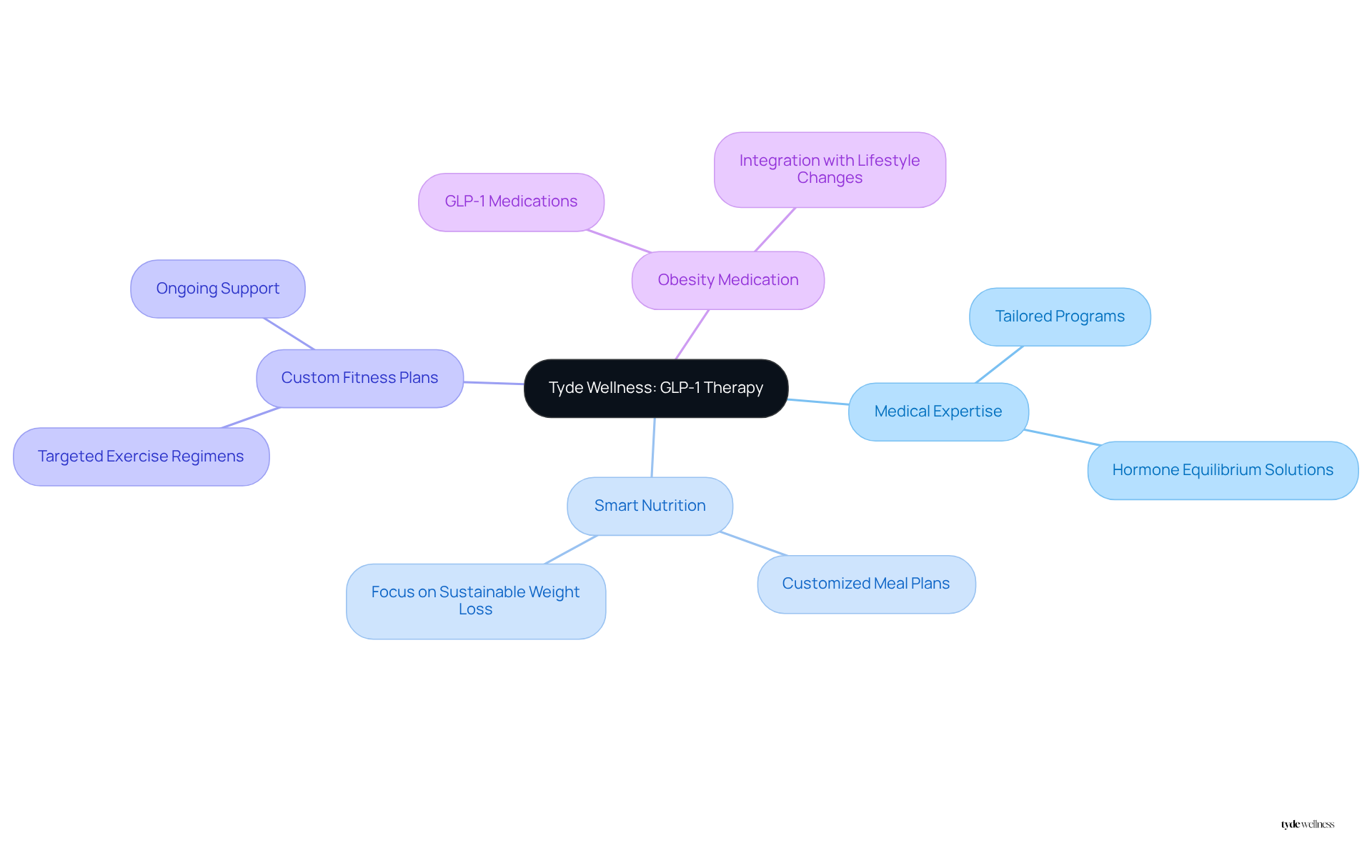
Understanding GLP-1 Medications: Mechanisms and Benefits
Glucagon-like peptide-1 (GLP-1) therapies, including semaglutide and tirzepatide, function by mimicking a hormone that plays a crucial role in appetite regulation and insulin secretion. These treatments promote feelings of fullness, helping individuals to feel satiated sooner, while also reducing cravings and enhancing insulin sensitivity.
Research indicates that patients using these medications alongside lifestyle modifications can achieve substantial weight loss, often exceeding 15%. Notably, studies highlight that women, particularly during hormonal changes such as menopause, experience marked benefits from these therapies. For instance, in the SURMOUNT-1 trial, premenopausal women receiving tirzepatide achieved an impressive 26% reduction in body mass, compared to just 2% in the placebo group. This illustrates the effectiveness of GLP-1 therapy as a vital obesity medication for women facing obesity challenges during significant life transitions.
At Tyde Wellness, we provide a holistic approach that encompasses:
- Physician-guided care
- Personalized nutrition plans tailored for busy lifestyles
- Text-based coaching
- Ongoing support specifically designed for women, particularly those with higher body mass index (BMI)
Our comprehensive support system empowers women to manage their weight effectively, ensuring they have the necessary resources throughout their weight loss journey.
However, it is important to acknowledge that treatment discontinuation rates may impact weight loss outcomes, and many patients might require higher maintenance dosages to sustain their results. As Dr. Beverly Tchang notes, “Clinicians prescribing tirzepatide can feel more confident recommending this treatment to their patients, especially women reporting menopause-related weight gain.” This underscores the potential of , bolstered by the individualized support at Tyde Wellness, to assist women in managing their weight efficiently.
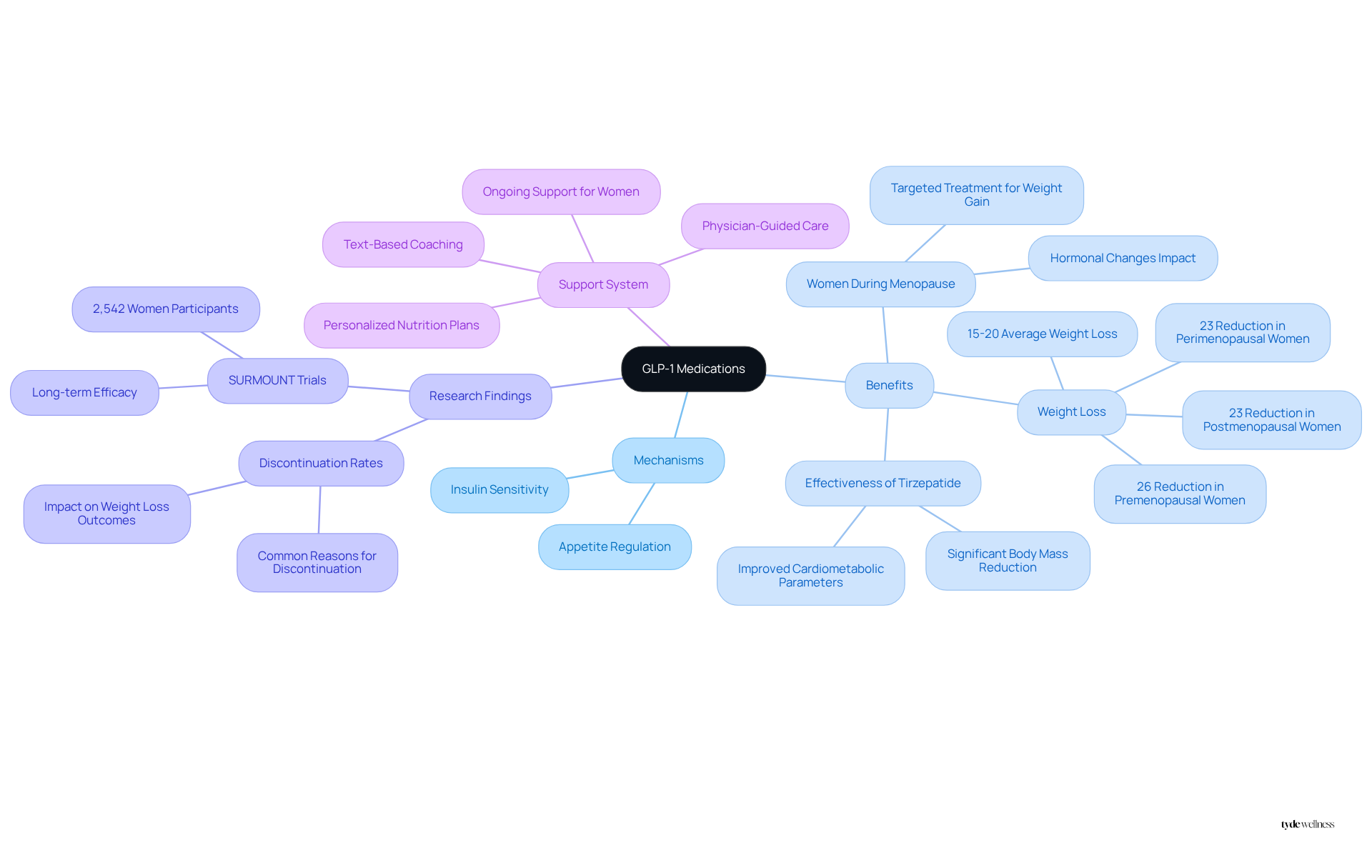
Recognizing Side Effects: What Women Should Expect from Obesity Medications
These treatments, while beneficial for reducing body mass, can lead to side effects that women should consider when taking obesity medication. Commonly reported issues include:
- Nausea
- Vomiting
- Diarrhea
- Constipation
Studies indicate that these symptoms are often mild to moderate and tend to diminish over time. For instance, gastrointestinal symptoms are among the most frequently experienced side effects, affecting a significant number of patients. To effectively manage these effects, women are encouraged to to discuss personalized strategies. Effective management techniques include:
- Staying well-hydrated
- Consuming smaller, more frequent meals
- Avoiding strong smells that may trigger nausea
By proactively addressing these side effects, women can enhance their experience with weight loss treatments and focus on achieving their goals.
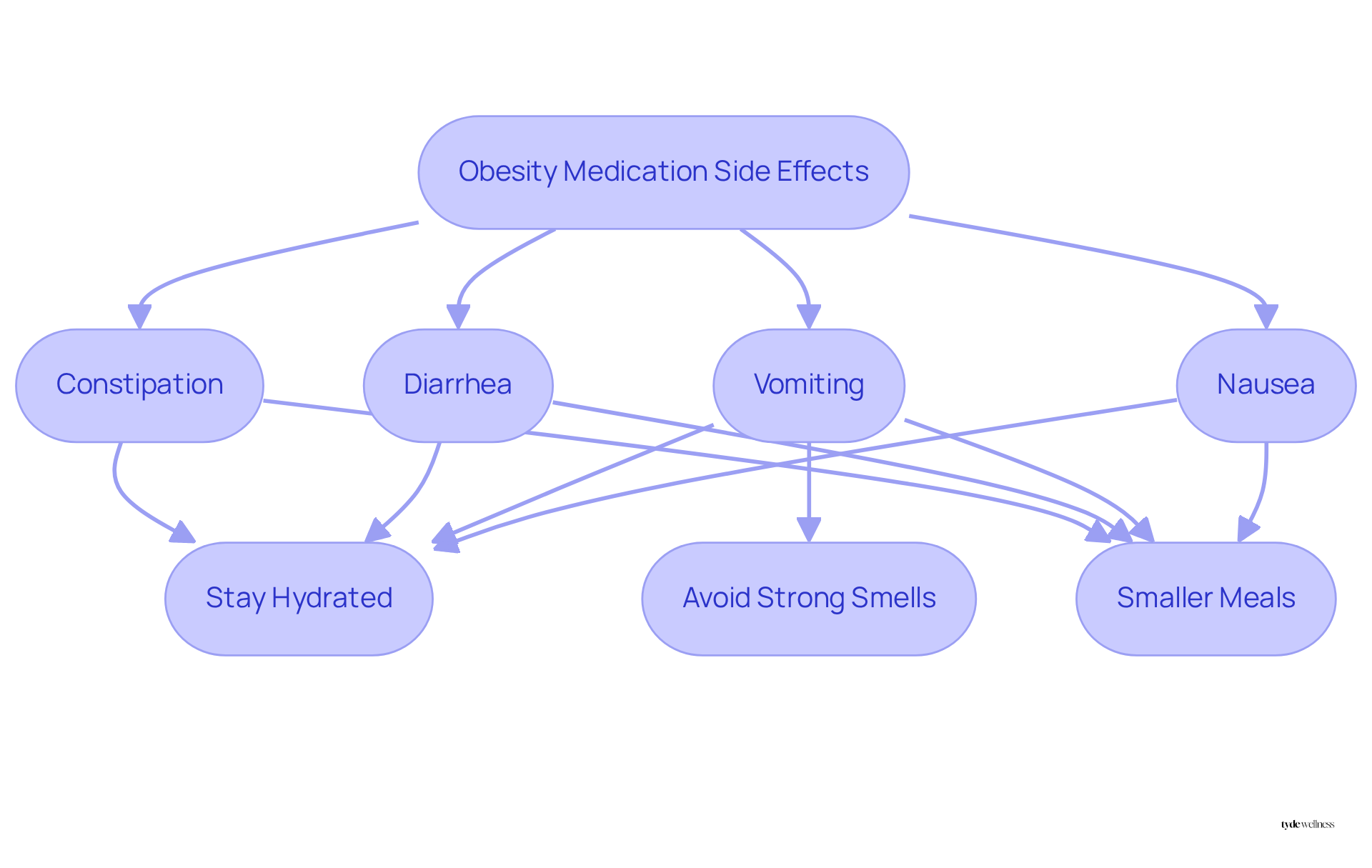
Navigating Insurance Coverage: Accessing Obesity Medications
Obtaining these treatments can be a complicated process due to the variations in insurance coverage policies. Many insurance plans set specific requirements that must be met before they authorize coverage for obesity medication treatments. Women seeking these treatments should first consult their insurance provider to clarify their plan’s requirements. Engaging in discussions with healthcare providers can also facilitate the approval process, ensuring that all necessary documentation and justifications are prepared.
At Tyde Wellness, we understand these challenges and offer tailored solutions for weight loss, including full-strength GLP-1 treatments designed to meet your needs. Our comprehensive support includes direct access to expert doctors and health coaches, ensuring you receive the guidance necessary to navigate the complexities of insurance effectively. Additionally, our customized nutrition plans and practical exercise strategies enhance your weight loss journey.
Recent legislative efforts have begun to address these challenges, with several states . For example, North Dakota has taken the lead by covering GLP-1 drugs under the Affordable Care Act, reflecting a growing recognition of the need for accessible obesity medication as a weight management solution. Furthermore, proposed bills in states such as California and Minnesota aim to expand insurance coverage for obesity medication and other essential treatments, potentially improving access for numerous patients.
Health policy experts stress the critical need for affordable access to obesity medication. As Rep. Mike Howard stated, “People should be able to access the health care they need, at a price they can afford.” This sentiment underscores the urgency of addressing the obstacles that prevent individuals from obtaining necessary treatments. Moreover, successful insurance approvals for obesity medication treatments have been reported, demonstrating the potential for positive outcomes when patients advocate for their health needs and effectively navigate the intricacies of insurance coverage. At Tyde Wellness, we are dedicated to providing affordable care options at $139/month and personalized support to help you achieve sustainable weight loss.
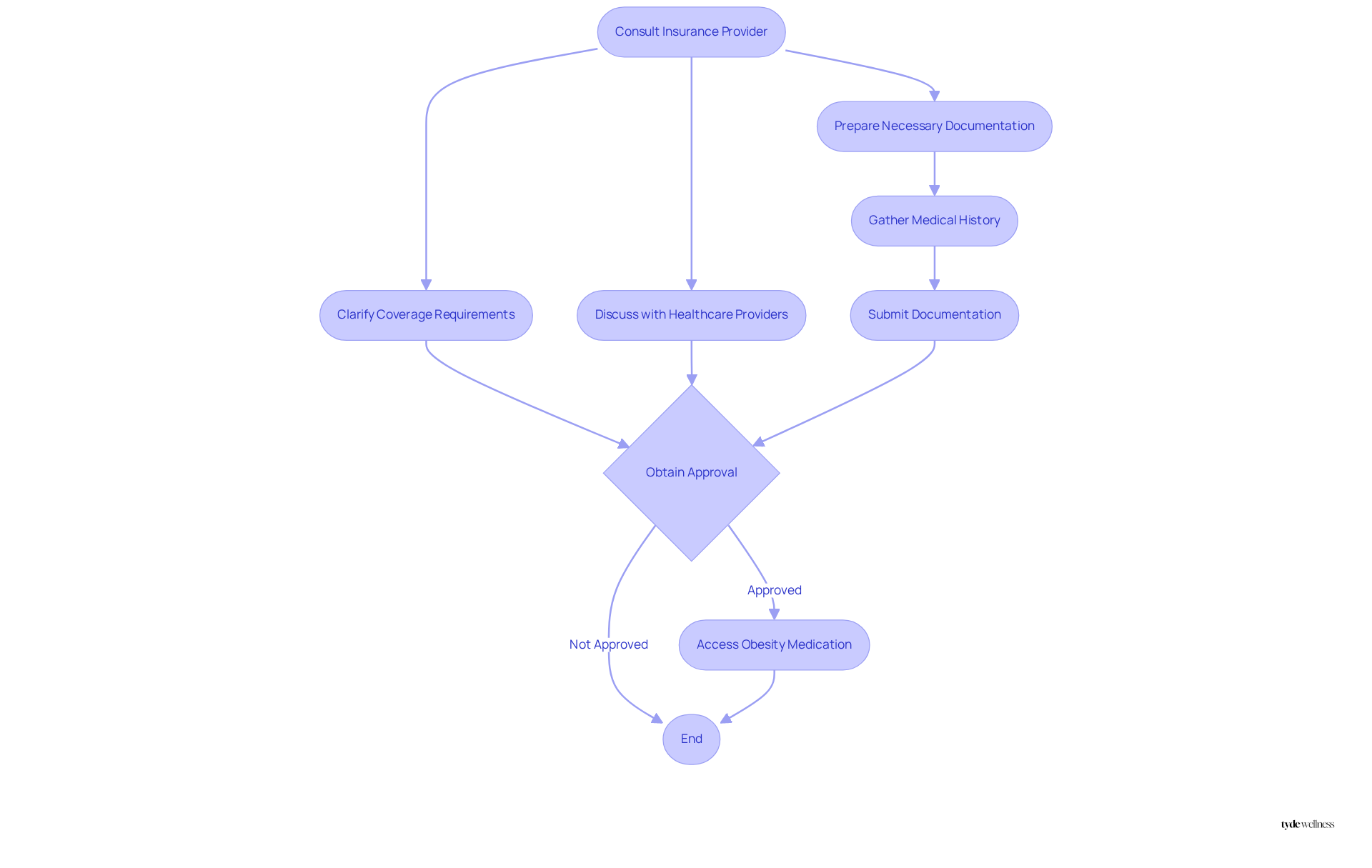
Consulting Your Doctor: Essential Steps Before Starting Obesity Medication
Consulting a healthcare provider before starting any weight loss treatment, particularly this specific obesity medication, is essential for women. This discussion should encompass a thorough examination of medical history, current treatments, and any underlying health conditions. Such evaluations are crucial, as they help determine the appropriateness of obesity medication, including GLP-1 medications, and facilitate a conversation about potential benefits and risks.
Studies indicate that many patients may not fully understand the importance of this stage; a survey revealed that a significant portion of adults would consider using obesity medication, specifically injectable slimming medications, without professional oversight. This underscores the necessity for comprehensive discussions to ensure a secure and with obesity medication.
Experts emphasize that a thorough review of medical history is vital, as it allows healthcare providers to tailor obesity medication treatment plans to individual needs. Furthermore, consistent follow-ups are recommended to monitor progress and address any side effects, highlighting the importance of ongoing communication with healthcare professionals throughout the weight loss process.
As a Tyde Circle member, you can take advantage of exclusive perks such as discounts on wellness programs and access to research-backed tools, enhancing your capability to support others. Engaging with your community not only empowers you but also fosters a supportive environment where women can share insights and experiences regarding their wellness journeys.
As Dr. Ellie Chuang states, ‘Always consult a healthcare provider before starting any obesity medication,’ emphasizing the necessity of professional guidance in this journey.
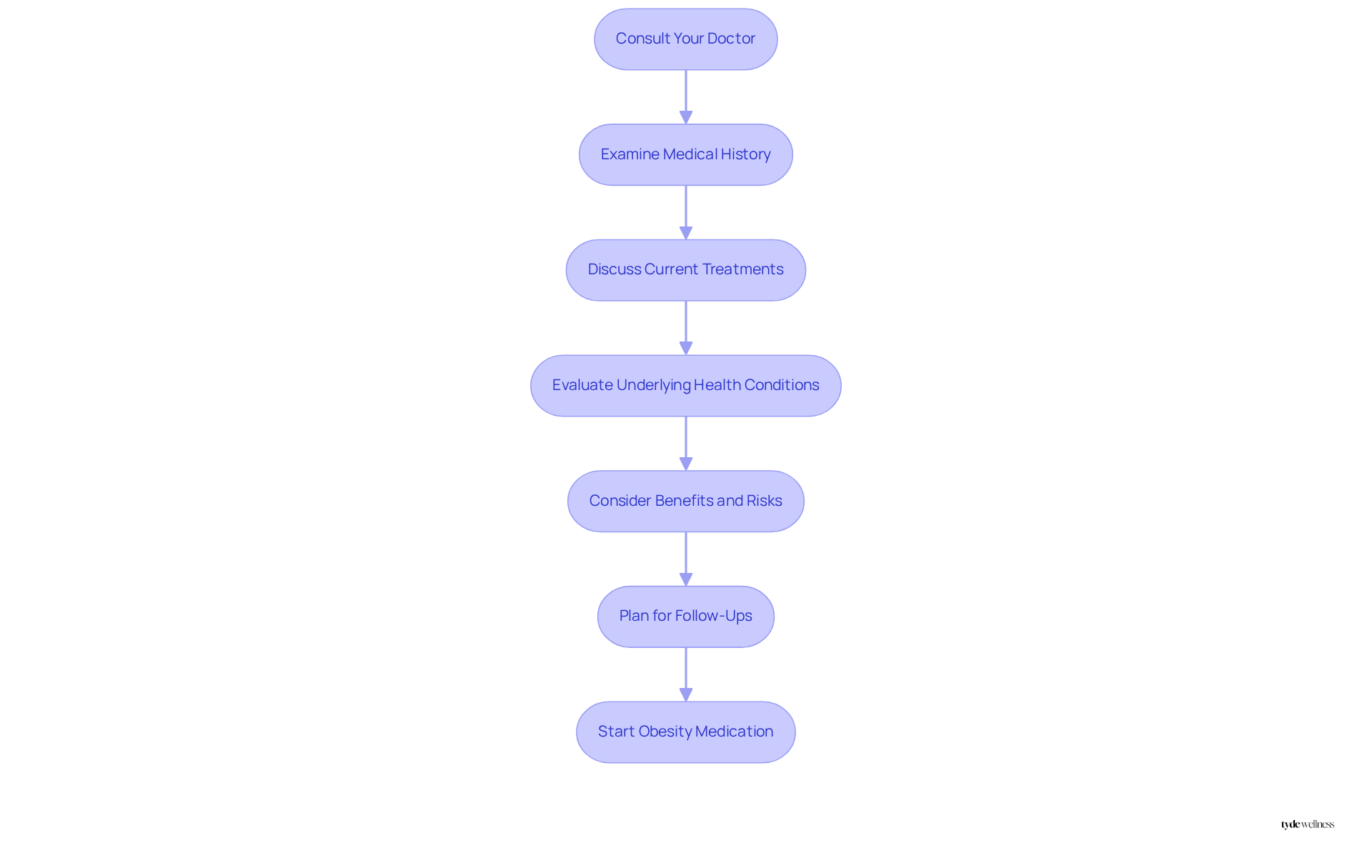
Long-Term Commitment: Understanding the Duration of Obesity Medication Use
The commitment to obesity medication, such as GLP-1 medications, for reducing body mass is often a long-term endeavor, particularly for perimenopausal women seeking sustainable results. Healthcare providers typically recommend a minimum duration of 6 to 12 months to achieve significant reductions in body mass. However, many patients may discover that ongoing treatment with obesity medication is essential to maintain their weight loss and prevent regain.
Notably, research indicates that 50-75% of users discontinue RA drugs within a year, highlighting the challenges of long-term compliance. At Tyde Wellness, we offer customized peptide therapy and comprehensive medications, ensuring that each patient receives individualized support to refine their goals.
Experts stress the importance of women engaging in open discussions with their healthcare providers regarding obesity medication and their long-term weight management objectives. Dr. Sadiya Khan points out that the high discontinuation rates of RA medications should alert clinicians and public health specialists. This collaborative approach is vital for developing a comprehensive strategy that , ensuring a sustainable path to health and wellness.
Furthermore, patients who continue their therapy at Tyde Wellness can experience significant benefits, including improved metabolic health and a 20-25% reduction in cardiovascular disease occurrences, underscoring the importance of adhering to prescribed treatment plans.
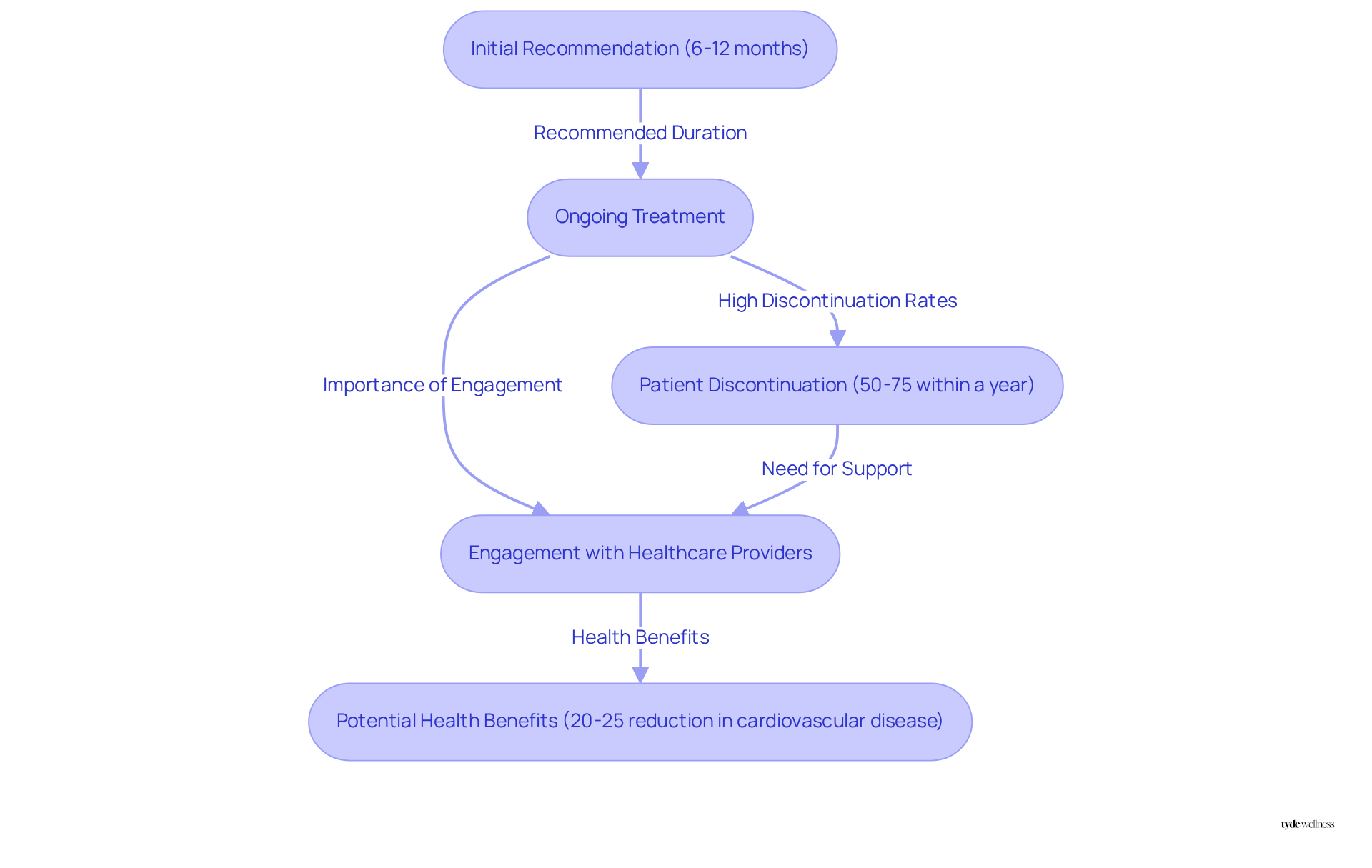
Eligibility Criteria: Who Can Benefit from Obesity Medications?
GLP-1 treatments are typically prescribed for individuals with a body mass index (BMI) of 30 or higher. Furthermore, those with a BMI of 27 or higher who also have weight-related health conditions, such as type 2 diabetes or hypertension, may qualify for these treatments. Recent studies indicate that approximately 17 million adolescents and young adults in the U.S. meet the criteria for GLP-1RA therapy, primarily due to obesity. This statistic underscores the increasing demand for effective management solutions across various demographics.
Women considering the use of should engage in discussions with their healthcare providers to assess their eligibility based on individual health conditions and weight loss goals. Healthcare professionals stress that understanding BMI thresholds is crucial for determining appropriate treatment paths. For instance, many healthcare providers advocate for a comprehensive evaluation of both BMI and associated health risks to ensure that patients receive tailored and effective care. By addressing these factors, women can make informed decisions about their management strategies for body mass.
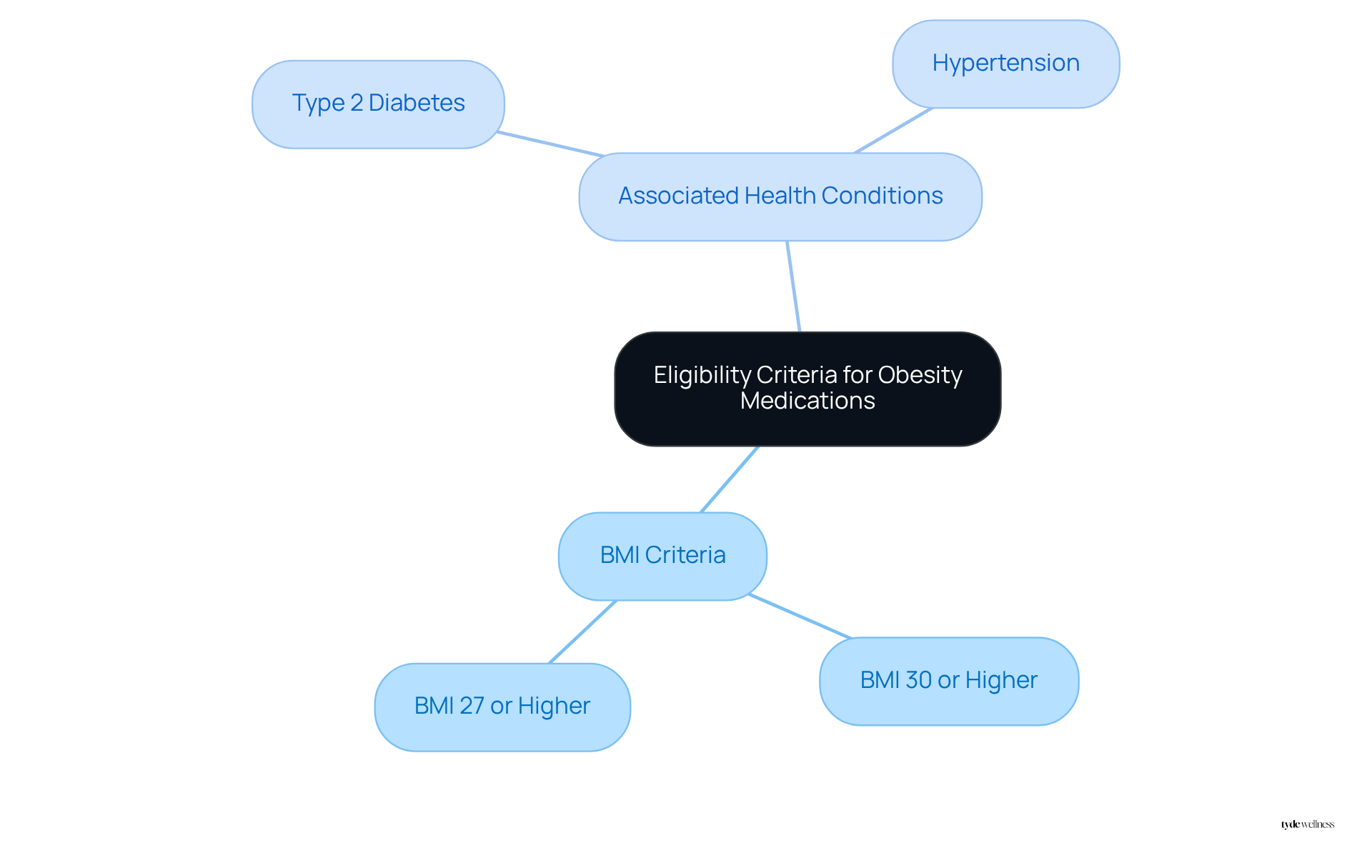
Behavioral Support: Enhancing Weight Loss with Psychological Strategies
Behavioral support is essential for maximizing the effectiveness of obesity medication in treatment. Cognitive-behavioral therapy (CBT) significantly enhances efforts to reduce body mass. Studies indicate that individuals who engage in CBT alongside obesity medication achieve greater reductions in weight and maintain motivation more effectively. For instance, research shows that those employing CBT methods can achieve a 10-15% reduction in body mass compared to individuals relying solely on medication.
Psychological strategies, including mindfulness practices and support groups, empower women to address emotional eating and develop healthier habits. These approaches not only foster resilience but also help manage cravings and emotional triggers that may impede progress in weight reduction. When combined with , these strategies have been linked to improved adherence and enduring results, as patients report feeling better equipped to face challenges.
Moreover, ongoing support plays a crucial role in this journey. Regular interactions with healthcare providers and coaches reinforce positive behaviors and provide accountability, which is vital for long-term success. By integrating the health benefits of specific treatments with robust psychological support, women can achieve more sustainable reductions in body mass and enhance their overall wellness.
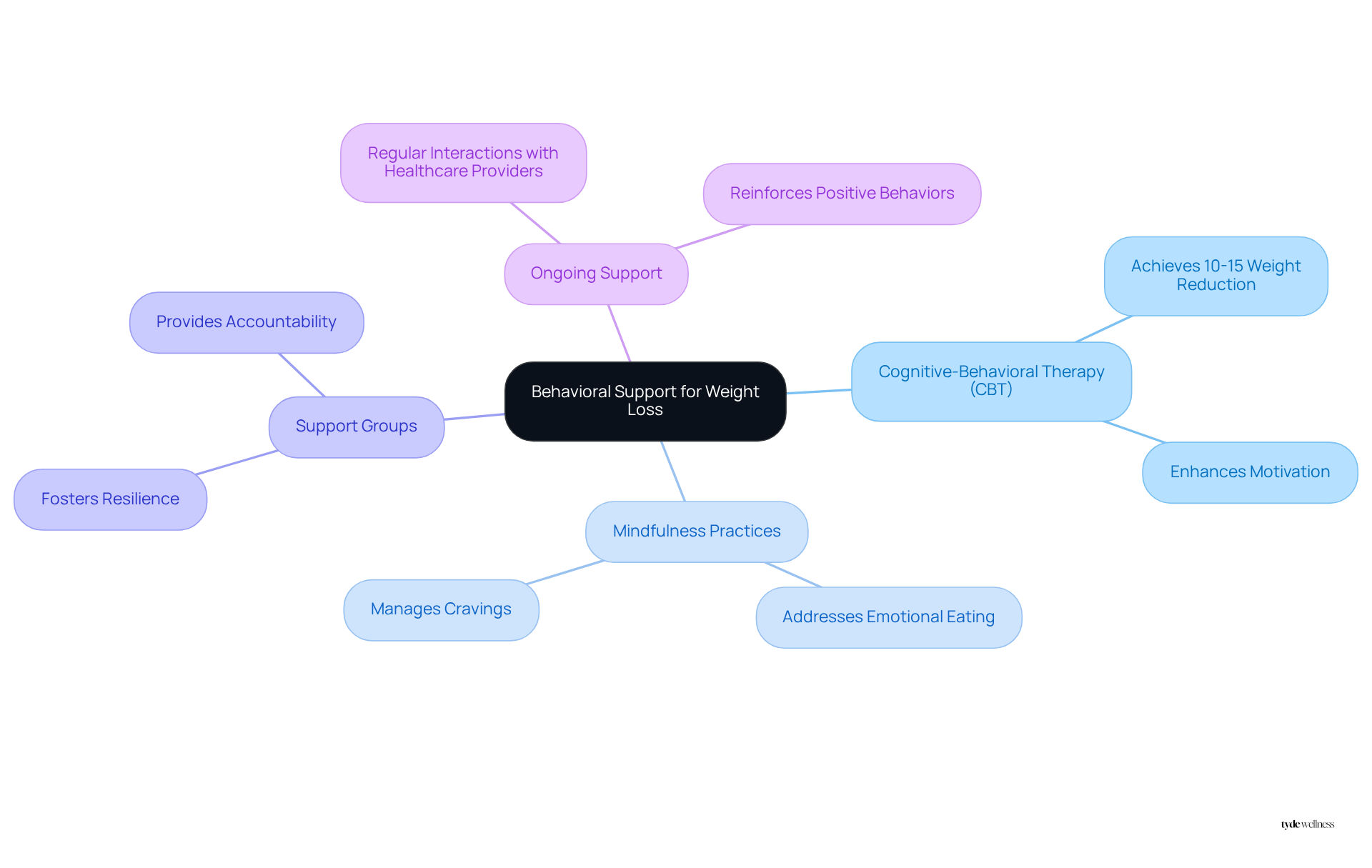
Ongoing Coaching Support: A Vital Component of Weight Loss Success
Continuous coaching assistance is essential for women undergoing fat reduction therapy with obesity medication at Tyde Wellness. Regular check-ins with a health coach or nutrition expert provide not only accountability but also encouragement and personalized guidance tailored to individual needs. Research indicates that individuals participating in coaching are more likely to achieve lasting reductions in body mass. Studies show that those receiving coaching assistance experience significantly higher success rates in reducing body mass compared to those who do not. This structured support helps women manage obstacles, celebrate achievements, and make necessary adjustments to their reduction plans.
Moreover, health coaches emphasize the importance of accountability in managing body composition. They assert that consistent assistance fosters a mindset conducive to long-term success. Patient experiences reveal that those actively engaging in coaching during their obesity medication GLP-1 therapy often report improved adherence to their weight loss strategies. This ultimately enhances their chances of .
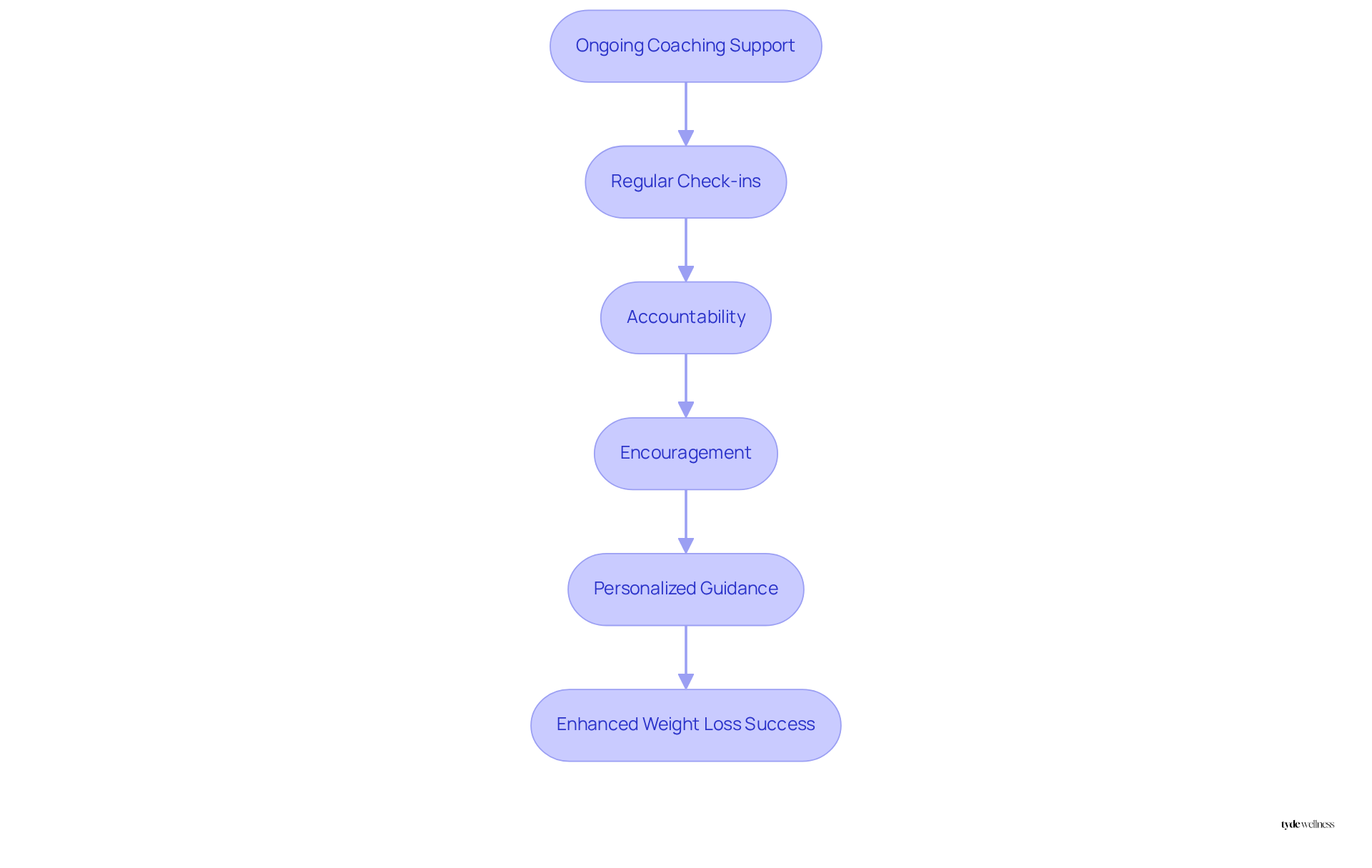
Conclusion
The exploration of obesity medication, particularly GLP-1 therapies, underscores their significant potential to transform women’s health during critical life transitions such as menopause. By offering personalized treatment plans, Tyde Wellness leads the charge in providing effective, tailored solutions that focus not only on weight reduction but also on enhancing overall well-being. This comprehensive approach empowers women to reclaim control over their health, fostering both physical and emotional growth.
Key insights from the article highlight:
- The mechanisms and benefits of GLP-1 medications
- The importance of addressing potential side effects
- The necessity of consulting healthcare providers before beginning a weight loss journey
Furthermore, the role of ongoing support—both behavioral and coaching—emerges as crucial for maintaining motivation and achieving sustainable results. The discussion surrounding insurance coverage further emphasizes the need for accessible treatment options, ensuring that women can obtain the necessary support to navigate their weight loss journeys effectively.
Ultimately, the journey toward effective weight management is multifaceted, requiring a blend of medical guidance, psychological support, and community engagement. Women are encouraged to actively participate in their health decisions, consult with professionals, and consider the holistic benefits of obesity medications like GLP-1 therapies. As the landscape of obesity treatment evolves, embracing these insights can lead to empowered choices and improved health outcomes, paving the way for a healthier future.
Frequently Asked Questions
What is Tyde Wellness and what services does it offer?
Tyde Wellness provides personalized GLP-1 therapy programs specifically designed for women experiencing menopause and perimenopause, focusing on body mass reduction through targeted therapies, hormone equilibrium solutions, smart nutrition, custom fitness plans, and obesity medication.
What are the benefits of Tyde Wellness’s approach to weight loss?
The advantages include ongoing support, a focus on sustainable weight loss, significant weight loss results (20-25% over a year), and improvements in energy, mood, and overall quality of life.
How do GLP-1 medications work for weight loss?
GLP-1 medications mimic a hormone that regulates appetite and insulin secretion, promoting feelings of fullness, reducing cravings, and enhancing insulin sensitivity, leading to substantial weight loss when combined with lifestyle modifications.
What results have been observed in women using GLP-1 medications?
Women, particularly during hormonal changes like menopause, have shown marked benefits. For example, in the SURMOUNT-1 trial, premenopausal women using tirzepatide achieved a 26% reduction in body mass compared to only 2% in the placebo group.
What support does Tyde Wellness provide for women managing their weight?
Tyde Wellness offers physician-guided care, personalized nutrition plans, text-based coaching, and ongoing support specifically designed for women, especially those with higher body mass index (BMI).
What side effects can women expect when taking obesity medications?
Common side effects include nausea, vomiting, diarrhea, and constipation. These symptoms are typically mild to moderate and tend to decrease over time.
How can women manage the side effects of obesity medications?
Women can manage side effects by staying well-hydrated, consuming smaller, more frequent meals, and avoiding strong smells that may trigger nausea. Consulting with healthcare providers for personalized strategies is also recommended.
List of Sources
- Tyde Wellness: Personalized GLP-1 Therapy for Effective Weight Loss
- TRICARE coverage of weight loss medications: What to know (https://militarynews.com/norfolk-navy-flagship/news/navy_medicine/tricare-coverage-of-weight-loss-medications-what-to-know/article_c002bbca-78ca-4fb6-a285-d117f56103a8.html)
- A new era of weight loss: Mental health effects of GLP-1 drugs (https://apa.org/monitor/2025/07-08/weight-loss-drugs-mental-health)
- A Community Conversation | A Community Conversation: New Weight-Loss Meds, Cure or Craze? | Season 2023 | Episode 9 (https://pbs.org/video/a-community-conversation-new-weight-loss-meds-cure-or-craze-6zo1jm)
- Hims & Hers Data Shows Personalized GLP-1 Plans Drive Real Weight Loss, Few Side Effects, and Strong Adherence to Care (https://finance.yahoo.com/news/hims-hers-data-shows-personalized-130000674.html)
- Understanding GLP-1 Medications: Mechanisms and Benefits
- Study identifies benefits, risks linked to popular weight-loss drugs | WashU Medicine (https://medicine.washu.edu/news/study-identifies-benefits-risks-linked-to-popular-weight-loss-drugs)
- Are GLP-1 drugs worth their current cost? – UChicago Medicine (https://uchicagomedicine.org/forefront/research-and-discoveries-articles/2025/june/glp-1-drug-pricing-analysis)
- Cleveland Clinic Research Finds Injectable Medications for Obesity Produce Smaller Weight Loss in A Real-World Setting, Compared to Randomized Clinical Trials (https://newsroom.clevelandclinic.org/2025/06/10/cleveland-clinic-research-finds-injectable-medications-for-obesity-produce-smaller-weight-loss-in-a-real-world-setting-compared-to-randomized-clinical-trials)
- Women in Menopause Benefit From GLP-1 Weight-Loss Medications as Much as Younger Women | Research | Advances in Endocrinology, and Women’s Health | NewYork-Presbyterian (https://nyp.org/advances/article/women-in-menopause-benefit-from-glp-1-weight-loss-medications-as-much-as-younger-women)
- Nearly 12 Percent of Americans Have Used GLP-1 Weight Loss Drugs; Medications Are Most Used by Women Aged 50 to 64 (https://rand.org/news/press/2025/08/nearly-12-percent-of-americans-have-used-glp-1-weight.html)
- Recognizing Side Effects: What Women Should Expect from Obesity Medications
- GLP-1 Weight Loss Medications: Safety, Diet and Side Effects | PCOM (https://pcom.edu/south-georgia/news/safety-benefits-and-side-effects-of-glp-1-weight-loss-medications.html)
- GLP-1 diabetes and weight-loss drug side effects: (https://health.harvard.edu/staying-healthy/glp-1-diabetes-and-weight-loss-drug-side-effects-ozempic-face-and-more)
- Ozempic face (and other GLP-1 side effects) (https://uclahealth.org/news/article/ozempic-face-and-other-glp-1-side-effects)
- What are the side effects of GLP-1 medications? (https://bcm.edu/news/what-are-the-side-effects-of-glp-1-medications)
- Navigating Insurance Coverage: Accessing Obesity Medications
- Live Updates: Insurance Coverage for GIP and GLP-1 Agonists Like Zepbound & Wegovy in 2025 – GoodRx (https://goodrx.com/healthcare-access/research/tracking-insurance-coverage-weight-loss-meds?srsltid=AfmBOoqvvwcP5ywePELZtQZKoa64cSdzZLyEiM6637onxZGkgODIH523)
- Minnesota mulls insurance mandate for weight-loss drugs (https://axios.com/local/twin-cities/2025/03/06/minnesota-insurance-mandate-weight-loss-drugs)
- Major insurance changes are coming to GLP-1 drugs for weight loss. Here’s how that could affect patients | CNN (https://edition.cnn.com/2025/07/01/health/zepbound-wegovy-insurance-cvs-bcbs-weight-loss)
- States Consider Requiring Insurers to Cover Weight-Loss Drugs (https://lexisnexis.com/community/insights/legal/capitol-journal/b/state-net/posts/states-consider-requiring-insurers-to-cover-weight-loss-drugs)
- Trump officials plan coverage for weight loss drugs under Medicare and Medicaid (https://theguardian.com/us-news/2025/aug/01/trump-weight-loss-drug-medicare-medicaid)
- Consulting Your Doctor: Essential Steps Before Starting Obesity Medication
- 3 Reasons To Involve Your Doctor In Your Weight Loss Journey (https://ucfhealth.com/health-tips/3-reasons-to-involve-your-doctor-in-your-weight-loss-journey)
- Debunking Myths About Weight Loss Drugs: Insights from Dr. Ellie Chuang (https://snhhealth.org/about-us/about-snhh/news-and-articles/truth-about-weight-loss-drugs-insights-dr-ellie-chuang)
- Who should be taking weight-loss drugs? Doctors share best candidates (https://foxnews.com/health/who-should-taking-weight-loss-drugs-doctors-share-recommendations)
- Who Can Prescribe Anti-Obesity Drugs: Get the Facts (https://healthcentral.com/condition/obesity/which-providers-prescribe-glp-1s)
- One in four adults would use a weight loss drug without consulting a physician (https://healio.com/news/primary-care/20240927/one-in-four-adults-would-use-a-weight-loss-drug-without-consulting-a-physician)
- Long-Term Commitment: Understanding the Duration of Obesity Medication Use
- Why do so many people stop taking weight-loss drugs within a year? (https://news.northwestern.edu/stories/2024/11/why-do-50-75-of-people-stop-taking-glp-1-drugs-within-a-year)
- Do You Have To Stay on Weight-Loss Drugs Forever? Maybe Not (https://orlandohealth.com/content-hub/do-you-have-to-stay-on-weight-loss-drugs-forever-maybe-not)
- Cleveland Clinic Study IDs Factors Behind Long-Term Weight Loss with GLP-1 RA Drugs (https://newsroom.clevelandclinic.org/2024/09/13/cleveland-clinic-study-identifies-key-factors-that-can-impact-long-term-weight-loss-in-patients-with-obesity-who-were-prescribed-glp-1-ra-medications)
- Researchers work to uncover new information on long-term use of obesity medications (https://uc.edu/news/articles/2024/11/uncovering-new-details-on-long-term-use-of-obesity-medications.html)
- Many Patients Quit Taking GLP-1 Drugs: Understanding Why Is Key (https://tctmd.com/news/many-patients-quit-taking-glp-1-drugs-understanding-why-key)
- Eligibility Criteria: Who Can Benefit from Obesity Medications?
- More Patients Potentially Eligible for GLP-1 Drug Coverage — Chicago Medical Society (https://cmsdocs.org/news/news/more-patients-potentially-eligible-for-glp-1-drug-coverage)
- TRICARE Coverage of Weight Loss Medications: What To Know (https://newsroom.tricare.mil/News/TRICARE-News/Article/4266447/tricare-coverage-of-weight-loss-medications-what-to-know)
- An estimated 17 million US youth meet criteria for GLP-1RA treatment (https://medicalxpress.com/news/2025-08-million-youth-criteria-glp-1ra.html)
- Who will benefit from new ‘game-changing’ weight-loss drug semaglutide? (https://uab.edu/news/research-innovation/who-will-benefit-from-new-game-changing-weight-loss-drug-semaglutide)
- FDA Approves New Medication for Chronic Weight Management (https://fda.gov/news-events/press-announcements/fda-approves-new-medication-chronic-weight-management)
- Behavioral Support: Enhancing Weight Loss with Psychological Strategies
- Could popular weight-loss drugs help treat addiction and dementia? (https://aamc.org/news/could-popular-weight-loss-drugs-help-treat-addiction-and-dementia)
- Coupling GLP-1 weight loss with mental health support (https://evernorth.com/articles/target-glp-1-users-mental-health-support)
- Nutritional Priorities to Support GLP-1 Therapy for Obesity – American Society for Nutrition (https://nutrition.org/nutritional-priorities-to-support-glp-1-therapy-for-obesity)
- WeightWatchers Launches New Behavior Change Program Designed to Support the Unique Needs of Individuals on GLP-1 Medications (https://business.weightwatchers.com/2023/behavior-change-program-to-support-individuals-on-glp-1-medications)
- App-Based Support Aids Weight Loss With Semaglutide, Studies Show (https://tctmd.com/news/app-based-support-aids-weight-loss-semaglutide-studies-show)
- Ongoing Coaching Support: A Vital Component of Weight Loss Success
- The importance of health coaching for holistic GLP-1 and weight management support – Personify Health (https://personifyhealth.com/resources/the-importance-of-health-coaching-for-holistic-glp-1-and-weight-management-support)
- Coaching for Sustainable Weight Loss: Tips and Strategies (https://le-guide-sante.org/actualites/medical-news-english/coaching-sustainable-weight-loss-tips-strategies)
- Health and Well-Being Coaching Adjuvant to GLP-1 Induced Weight Loss – PMC (https://pmc.ncbi.nlm.nih.gov/articles/PMC11577329)
- OPTAVIA highlights the importance of coaching in weight management (https://newschannel9.com/the-daily-refresh/optavia-highlights-the-importance-of-coaching-in-weight-management)
- Lose Weight Smarter with a Weight Loss Coach (https://bluecrestwellness.com/article/lose-weight-smarter)



